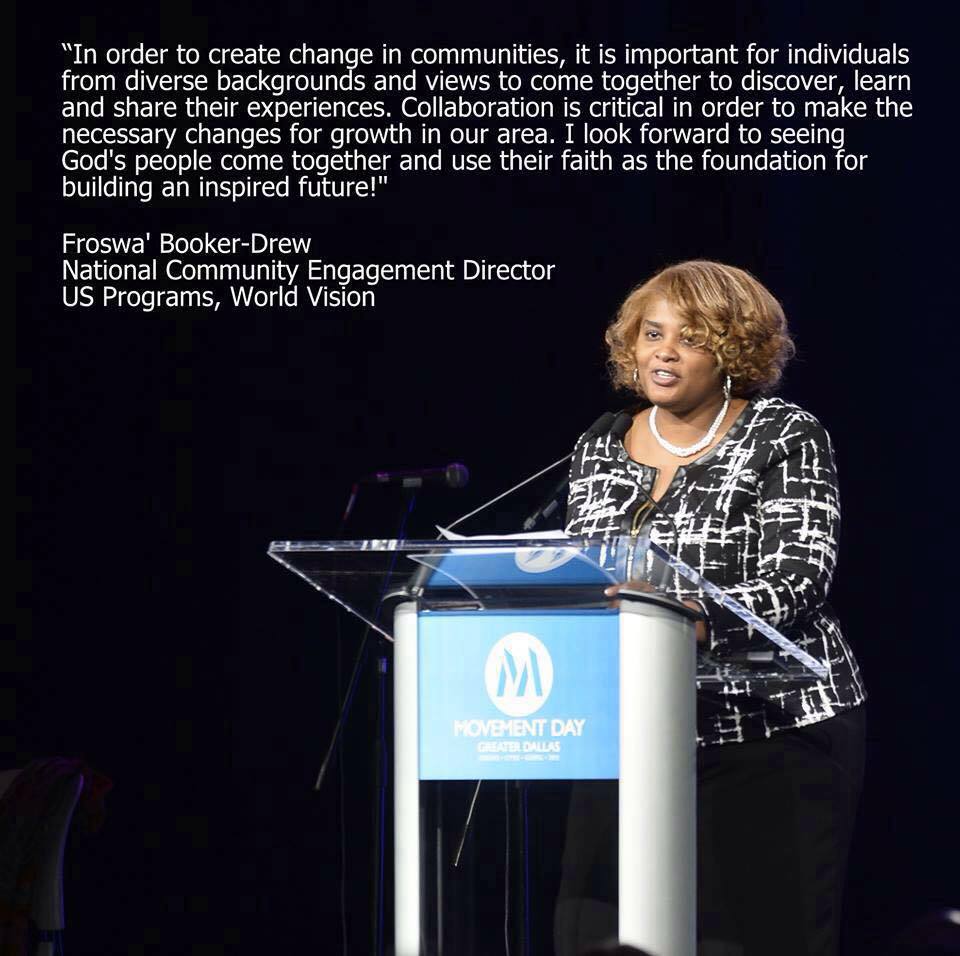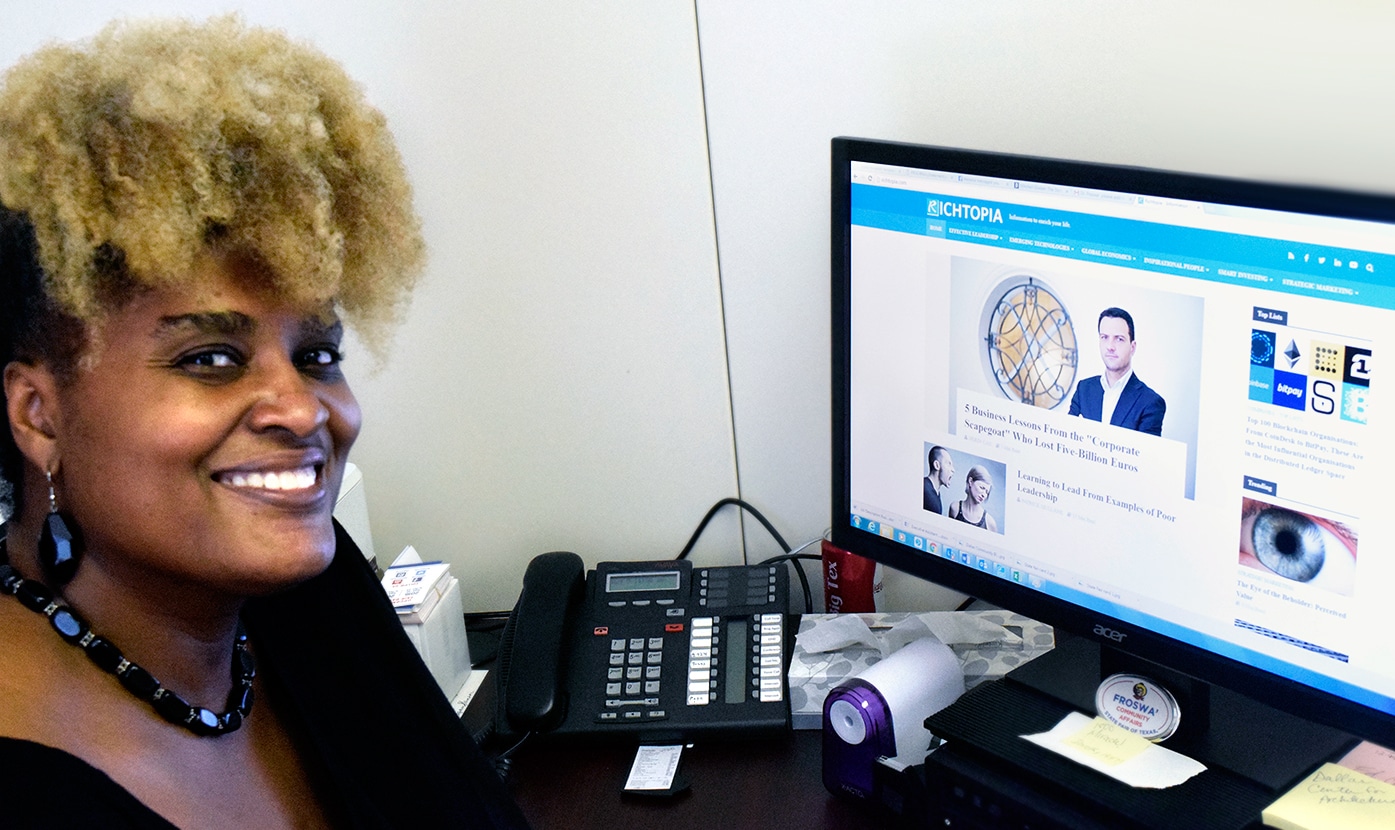Dr. Froswa’ Booker-Drew is an author, speaker, trainer and consultant with more than two decades of experience in community development. She has an extensive background in nonprofit management, partnership expansion, training and education. At the time of writing she is the Director of Community Affairs and Strategic Alliances in the State Fair of Texas®.
Booker-Drew inspires me through her long-term commitment to promote the welfare of others, expressed especially by her involvement in many non-profit organisations. As a result of all her voluntary contributions to society, she has received many honours including from the University of Texas, American Red Cross, TED Talks, UNICEF, and more.

What does being a university professor and community developer mean to you?
I love sharing information. I have been so blessed to have some amazing individuals who have poured into my life and I enjoy being able to provide that information either formally with my students or informally through my work in the community. Both experiences have taught me so much and I find that I am continuing to learn. These roles allow me to connect to others, expand my knowledge, give back, and grow.
Why do people need to pay attention to social capital?
Social capital is important because it is about relationships. I wish there was another term for social capital because it denotes, in my opinion, transactional relationships especially because of the image capital brings to mind. For example of a transactional relationship, I need something and if you benefit, that’s great but it isn’t my focus. Although these relationships are a part of our daily lives, I love to build transformational relationships that help me and those I work with personally and professionally. For me, it’s important to build high quality connections that make a difference at a deeper level for those involved. We can’t do this everyday with everyone we meet but we could be intentional about building our network to include both. The challenge we have in our society is to move beyond building relationships with those who are like us–race, class, ideology, etc.–to those who are different. In these relationships, we are challenged as well as gain new information and insight.
If you could spend a day hanging-out with three people from history who passed-away for advice, who would they be and why?
There are sooo many! This is hard!
I would love to meet Ida B. Wells. Wells was a journalist, activist and just a brilliant woman who was so brave and fought for justice. The many articles she wrote brought attention to the numerous lynchings that happened across the US in the early 1900s. As a woman and an African American during the time of segregation, she risked her life for her beliefs and for those who did not have a voice. I am curious to learn more about her convictions, how she was able to handle the challenges of being a woman of color and juggle her personal life at a time when there were limited conveniences as we have today.
I would love to hang out with Martin Luther King, Jr. because I would love to understand his ability to love and his ability to deal with conflict under extreme stress and with grace. I am in awe of his commitment to doing this.
I would love to hang out with Mother Theresa because as a person of faith, I would love to understand how she dealt with moments of doubt and what allowed her to preserve for the greater good.
How does your favourite strategic-alliance process work from planning to execution?
Typically, I am careful to identify the assets that exist within a community before creating a plan on what should be done or use my opinion as the basis for determining the need. I believe that listening is critical and to build a strong relationship, you must listen to the needs. I think many people build relationships based solely on what they need but fail to think of ways to create win-win opportunities and instead of listening, they are determined to give their pitch and point of view first. In doing this, they miss out on the verbal and non-verbal cues.
I love when there are opportunities to not only brainstorm the possibilities but also focus on outcomes that we can achieve with timelines and milestones. For instance, I had a call with a large international company about partnering with our organization to better serve the community. In addition to the possibility of working together on one project, I asked if there were other opportunities to partner with different departments within the organization that could offer volunteers, technical assistance, etc. and because of the ask, the company is elated to explore these ideas. This creates a win-win for all involved–our organization is better able to serve the community through this resource; the community will have several resources to take advantage of and the company will be able to tap into its human, social, and financial capital to make a difference.
If you could put a percentage on the satisfaction in your life, what would it be? And why?
80%. I am fortunate to do what I love but there is always room for improvement!
What book do you ask your associates to read?
There are several:
Building the Bridge As You Walk On It by Robert E. Quinn,
Leadership for the Disillusioned by Amanda Sinclair,
Immunity to Change by Kegan and Lahey,
The Practice of Adaptive Leadership by Alexander Grashow and Ronald Heifetz
Why is gender equality so important?
It is an issue of fairness and justice. Women have so much to offer and we are missing out on the gifts and talents that women can provide when we are not involved (or the involvement is limited) in all levels of an organization or company. I love the definition that the UN offers: “The overall objective of gender equality is a society in which women and men enjoy the same opportunities, rights and obligations in all spheres of life.“
How have you gone about becoming so successful through your philanthropic contributions? And what tips would you give to our readers who want to do the same?
I love being able to give. It’s more than giving a financial contribution, I believe that my time and gifts are important contributions to share with others. I have gained so much from giving–I have learned so much and grown tremendously. My perceptions have been challenged and changed as a result. Sometimes, it is so easy to write a cheque but to actually be involved with those you are serving can be mutually beneficial.
My experiences have allowed me to become an advocate–it is no longer “those” people because now I know the stories instead of relying on assumptions or statistics. Actually, my first job came as a result of volunteering. I did not realize people were watching my efforts but it made a difference! I would encourage readers to make a commitment to volunteering–share your gifts and talents with individuals and organizations that could benefit from what you can offer. These in-kind resources are invaluable to nonprofits and are needed!
What advice would you give to new program developers?
Find a mentor. It is important to find individuals that can speak into your life and are doing the work you’d like to do.
Keep learning. It is always important to invest in your growth and development.
Take the time to reflect. So many people are busy doing but do not take the time to reflect and process to learn from their life experiences.
What are some of your aims for the next five years?
There are a number of goals I have but the short list is the following: I would love to write another book, share my knowledge and story around the world as a speaker/teacher.
Please summarise your life in 3 words.
Blessed Beyond Belief.
If you enjoyed this interview with Dr. Froswa’ Booker-Drew, retweet and comment please




